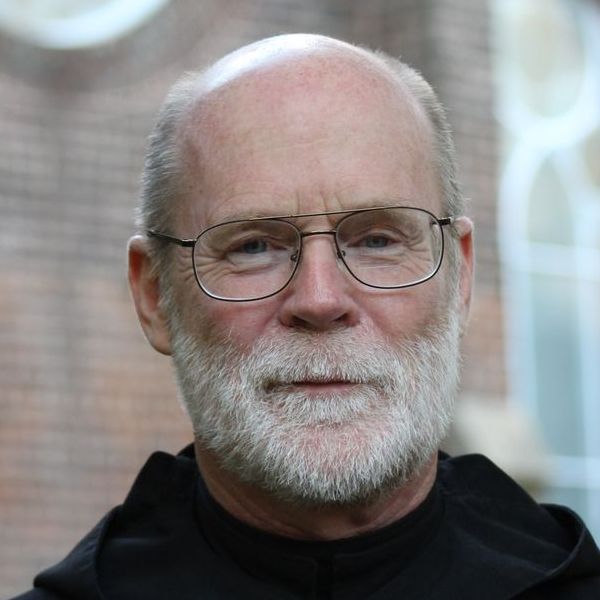Whether you have questions about discernment and vocations or want general information about Belmont Abbey, we invite you to reach out and ask!
Homilies

December 16, 2019
Third Sunday of Advent, December 15, 2019

I had a happy experience yesterday. I ran into one of our alumni who told me about his son, who now at age three, is able to be filled with excitement about Santa, and asks every day, “Is he coming?!” His father keeps telling him, “No. We have to light all the candles first” [on the Advent wreath]. His joy in his son lit up the room. It was a real joy not unmixed with the realities of life, for he added that he had thought that the “terrible twos” were bad, but that the “three-teens’, as he put it, were proving perhaps more challenging.
This was a happy experience on many levels. I well remember when this young father had arrived here, a late teenager himself, and now he is a husband and father, working hard and enjoying his job. It was a reminder of God’s goodness that we are able to sponsor our college and see the transformation it works in the lives of young students. I was happy to hear him tell of his son’s excitement over Christmas. I’m sure those of you who are blessed to be parents have carefully stored up in your hearts the memories of your own children at age three and their joy in this season. We ourselves can likely call to mind long distant childhoods and magical expectation that Santa would come; an expectation mixed with a certain anxiety. After all, Santa knew who had been naughty and nice, and we were all too clearly aware that we at times had been among the naughty. Yet there was the unfailing certainty that, since we really did try hard to be good, Santa would, in the end, overlook the naughtiness. On Christmas, we were introduced through the gifts he had left to the experience of free, unmerited and abundant love and mercy.
At some point, of course, we came to realize that Santa was not who we had thought he was. Santa was Mom and Dad, family and friends, who, on Christmas Day, showered us with gifts of love and affection. For on that day, there had been revealed in Bethlehem long ago, the gift of the Father’s love, who so loved the world that he sent His Son, not to condemn the world, but that through him the world might be saved.
This happy encounter was for me a living commentary on today’s instruction for us from the Word of God. For we have arrived at the third Sunday of our Advent preparation. The liturgy of this Sunday itself strains forward in eager expectation as the coming feast of our salvation draws near. But what of us? What of our Advent preparation? Little Andrew can hardly contain his excitement and asks every day, “Is he coming today?” Jesus has told us, Unless you … become like little children, you will not enter the Kingdom of Heaven. But how many of us are filled with excitement and eager expectation over the coming of Jesus. We know Jesus will come, but do we long for his coming? This Season of Advent is given to us to increase our longing for the coming of Jesus, but do we use it well? What does our instruction from the Word of God today have to tell us?
We are, I think, like John the Baptist. Having preached a message of repentance because the One who was to come was near, having baptized the Lord in the River Jordan, and having proclaimed the demands of God’s Law to King Herod, John is now in prison where he will die. He sends messengers to Jesus to ask, Are you the one who is to come, or should we look for another? The cruelty of imprisonment has perhaps worn him down; Jesus is not conforming to what John had expected of the Messiah. He is tempted to doubt. Jesus responds to John’s messengers: Go and tell John what you hear and see: the blind regain their sight, the lame walk, lepers are cleansed, the dead are raised, and the poor have the good news proclaimed to them. Jesus knew that John, undoubtedly familiar with the divinely inspired Scriptures, would recognize at once the prophecy of Isaiah which we, too, hear heard today in our first reading: Then will the eyes of the blind be opened, the ears of the deaf be cleared; then will the lame leap like a stag, then the tongue of the mute will sing. Elsewhere the same prophet says: Your dead shall live, their corpses shall rise; awake and sing, you who lie in the dust. He points John towards these signs in order to confirm his faith.
Advent urges us as well to look for signs to confirm our faith. How often have we opened our Bible in this Advent so that we, like John the Baptist, can learn of God’s plan of salvation. If our answer is that we haven’t bothered to open it at all, then I urge you to turn to Chapter 40 of the Prophet Isaiah and read a little each day until you reach the end. Then go to the gospels.
Too easily can we, like John the Baptist, be worn down by the heaviness of life, by our inveterate sinfulness so resistant to our efforts to change, by the hostility to the gospel that marks contemporary entertainment and media, by the blatant lies, lust for power and incivility that characterize public life and administration. Have we been gradually coopted into the crass materialism and consumerism which has diabolically corrupted Christmas that we have unwittingly lost our hope and our joy?
Advent urges us to look for signs to confirm our faith. Our young alumnus tempers his son’s excitement with the reminder that we must wait until all the candles on the Advent wreath have been lit. Through this simple observance, the Advent wreath, whose candles so catch a child’s attention, he is teaching him a profound lesson of faith. It was not until the fullness of time that God sent His Son. That fullness of time was known to God alone, not to us, and thus we, too, must wait until that fullness of time with the Son will come in glory. And we must learn to wait for it with the eager expectation of children, asking ourselves each day, “Is he coming today?”
Just as this father is teaching his young son, so let us learn through the church’s faith and liturgy to be able to recognize, as John was able to recognize, the subtle and quiet signs of God’s love and provident care. Jesus has given us in this Eucharist his very Body, and his true Blood for the forgiveness of our sins. Rather than be worn down by our struggle against temptation and sin, we ought to yearn to eat this Body, to wish to drink in abundance this Blood poured out for the forgiveness of our sins so that Jesus can sustain us in our struggle and the victory be his. The Letter of James has urged us again and again today: Be patient, brothers and sisters, until the coming of the Lord. See how the farmer waits… being patient…You too must be patient. Take as an example of hardship and patience … the prophets who spoke in the name of the Lord. Four times we are urged to be patient, but do we heed that? How often do we excuse our incivility by saying that the other person was rude to me, thus making our virtue not our own, but rather dependent on another’s? How often do we withhold forgiveness, making the other ask for it? How often do we make the hope of gain the measure of our giving? Let us rather put into practice the Apostle’s words: Put on then, as God’s chosen ones, hoy and beloved, heartfelt compassion, kindness, humility, gentleness, and patience, bearing with one another and forgiving one another… In our Christmas preparation, let us be guided by Jesus’ words: Give and gifts will be given to you; a good measure, packed together, shaken down, and overflowing, will be poured into your lap.
And so, brothers and sisters, on this third Advent Sunday, if we find that the cares of life, our sins and the lies and injustice of the world have tempted us to lose faith that one day the desert and the parched land will exalt, the steppe will rejoice and bloom… with abundant flowers and rejoice with joyful song then let us learn from the Scriptures and the church’s liturgy to strengthen the hands that are feeble and make firm the knees that are weak. Let us learn to recognize the signs that the One who is to come is among us, in the excitement of little children, in the kindness and forbearance we are called to show to one another. Let us have great confidence that one day we will be among those who enter Zion singing, crowned with everlasting joy; they will meet with joy and gladness, sorrow and mourning will flee.
Abbot Placid Solari, O.S.B.